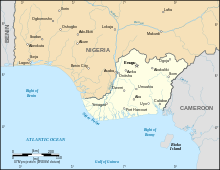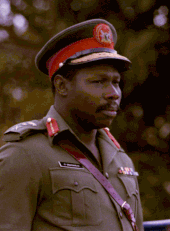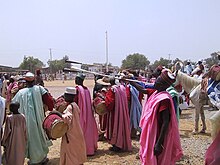Federal Republic of Nigeria, commonly referred to as Nigeria, is a federal constitutional republic in West Africa, bordering Benin in the west, Chad and Cameroon in the east, and Niger in the north. Its coast in the south lies on the Gulf of Guinea in the Atlantic Ocean. It comprises 36 states and the Federal Capital Territory, where the capital, Abuja is located. Nigeria is officially a democratic secular country.
Modern-day Nigeria has been the site of numerous kingdoms and tribal states for millennia. The modern state originated from British colonial rule beginning in the 19th century, and the merging of the Southern Nigeria Protectorate and Northern Nigeria Protectorate in 1914. The British set up administrative and legal structures whilst practicing indirect rule through traditional chiefdoms. Nigeria became a formally independent federation in 1960, and plunged into a civil war from 1967–1970. It has since alternated between democratically-elected civilian governments and military dictatorships, until it achieved a stable democracy in 1999, with its 2011 presidential elections being viewed as the first to be conducted reasonably freely and fairly.
Nigeria is often referred to as the "Giant of Africa", owing to its large population and economy. With approximately 174 million inhabitants, Nigeria is the most populous country in Africa and the seventh most populous country in the world. Nigeria has one of the largest populations of youth in the world. The country is viewed as a multinational state, as it is inhabited by over 500 ethnic groups, of which the three largest are the Hausa, Igbo and Yoruba; these ethnic groups speak over 500 different languages, and are identified with wide variety of cultures. Nigeria is divided roughly in half between Christians, who live mostly in the southern and central parts of the country, and Muslims in the northern and southwestern regions. A minority of the population practise religions indigenous to Nigeria, such as those native to Igbo and Yoruba peoples.
As of 2015, Nigeria is the world's 20th largest economy, worth more than $500 billion and $1 trillion in terms of nominal GDP and purchasing power parity respectively. It overtook South Africa to become Africa's largest economy in 2014. Also, the debt-to-GDP ratio is only 11 percent, which is 8 percent below the 2012 ratio. Nigeria is considered to be an emerging market by the World Bank; It has been identified as a regional power on the African continent, a middle power in international affairs, and has also been identified as an emerging global power. Nigeria is a member of the MINT group of countries, which are widely seen as the globe's next "BRIC-like" economies. It is also listed among the "Next Eleven" economies set to become among the biggest in the world. Nigeria is a founding member of the Commonwealth of Nations, the African Union, OPEC, and the United Nations amongst other international organizations.
In the 2014 ebola outbreak, Nigeria was the first country to effectively contain and eliminate the Ebola threat that was ravaging three other countries in the West African region, as its unique method of contact tracing became an effective method later used by other countries, such as the United States, when Ebola threats were discovered.
Since 2002, the North East of the country has seen sectarian violence by Boko Haram, an Islamist movement that seeks to abolish the secular system of government and establish Sharia law. Nigerian President Goodluck Jonathan in May 2014 claimed that Boko Haram attacks have left at least 12,000 people dead and 8,000 people crippled. At the same time, neighboring countries, Benin, Chad, Cameroon and Niger joined Nigeria in a united effort to combat Boko Haram in the aftermath of a world media highlighted kidnapping of 276 schoolgirls and the spread of Boko Haram attacks to these countries
Independent Federation and First Republic (1960–1966)
Nigeria gained independence from the United Kingdom as a Commonwealth Realm on 1 October 1960. Nigeria's government was a coalition of conservative parties: the Nigerian People's Congress (NPC), a party dominated by Northerners and those of the Islamic faith, and the Igbo and Christian-dominated National Council of Nigeria and the Cameroons (NCNC) led by Nnamdi Azikiwe. Azikiwe became Nigeria's maiden Governor-General in 1960. The opposition comprised the comparatively liberal Action Group (AG), which was largely dominated by the Yoruba and led by Obafemi Awolowo. The cultural and political differences between Nigeria's dominant ethnic groups – the Hausa ('Northerners'), Igbo ('Easterners') and Yoruba ('Westerners') – were sharp.An imbalance was created in the polity by the result of the 1961 plebiscite. Southern Cameroon opted to join the Republic of Cameroon while Northern Cameroons chose to remain in Nigeria. The northern part of the country was now far larger than the southern part. In 1963, the nation established a Federal Republic, with Azikiwe as its first president. When elections were held in 1965, the Nigerian National Democratic Party came to power in Nigeria's Western Region.
Civil war (1967–1970)
Main article: Nigerian Civil War
The Republic of Biafra in June 1967, when it declared its independence from the rest of Nigeria
Later, the counter-coup of 1966, supported primarily by Northern military officers, facilitated the rise of Lt. Colonel Yakubu Gowon to head of state. Tension rose between North and South; Igbos in Northern cities suffered persecution and many fled to the Eastern Region.
In May 1967, the Eastern Region declared independence as a state called the Republic of Biafra, under the leadership of Lt. Colonel Emeka Ojukwu. The Nigerian Civil War began as the official Nigerian government side (predominated by soldiers from the North and West) attacked Biafra (Southeastern) on 6 July 1967 at Garkem. The 30 month war, with a long siege of Biafra and its isolation from trade and supplies, ended in January 1970. Estimates of the number of dead in the former Eastern Region are between 1 and 3 million people, from warfare, disease, and starvation, during the 30-month civil war.
France, Egypt, the Soviet Union, Britain, Israel, and others were deeply involved in the civil war behind the scenes. Britain and the Soviet Union were the main military backers of the Nigerian government while France and others aided the Biafrans. Nigeria used Egyptian pilots for their air force.
Military juntas (1970–1999)
Main article: Nigerian military juntas of 1966–1979 and 1983–1998
Olusegun Obasanjo was a military president who ruled the country from 1976 to 1979.
Beginning in 1979, Nigerians participated in a brief return to democracy when Olusegun Obasanjo transferred power to the civilian regime of Shehu Shagari. The Shagari government became viewed as corrupt and incompetent by virtually all sectors of Nigerian society. The military coup of Muhammadu Buhari shortly after the regime's fraudulent re-election in 1984 was generally viewed as a positive development. Buhari promised major reforms, but his government fared little better than its predecessor. His regime was overthrown by another military coup in 1985.
The new head of state, Ibrahim Babangida, declared himself president and commander in chief of the armed forces and the ruling Supreme Military Council. He set 1990 as the official deadline for a return to democratic governance. Babangida's tenure was marked by a flurry of political activity: he instituted the International Monetary Fund's Structural Adjustment Program (SAP) to aid in the repayment of the country's crushing international debt, which most federal revenue was dedicated to servicing. He enrolled Nigeria in the Organisation of the Islamic Conference, which aggravated religious tensions in the country.
After Babangida survived an abortive coup, he pushed back the promised return to democracy to 1992. Free and fair elections were finally held on 12 June 1993, with a presidential victory for Moshood Kashimawo Olawale Abiola. Babangida annulled the elections, leading to mass civilian violent protests which effectively shut down the country for weeks. Babangida finally kept his promise to relinquish office to a civilian-run government, but not before appointing Ernest Shonekan as head of the interim government. Babangida's regime has been considered the most corrupt, and responsible for creating a culture of corruption in Nigeria.
Shonekan's caretaker regime was overwhelmed in late 1993 by the military coup of General Sani Abacha. Abacha used violence on a wide scale to suppress the continuing civilian unrest. He shifted money to offshore accounts in various western European banks and voided coup plots by bribing army generals. Several hundred million dollars in accounts traced to him were discovered in 1999. The regime came to an end in 1998 when the dictator was found dead amid questionable circumstances.
His successor, General Abdulsalami Abubakar, adopted a new constitution on 5 May 1999, which provided for multiparty elections. On 29 May 1999 Abubakar transferred power to the winner of the elections, Obasanjo, who had since retired from the military.
Democratization (1999–)
Bida Emirate durbar festival, 2001
Ethnic violence for control over the oil-producing Niger Delta region and inadequate infrastructures are some of the issues in the country. Umaru Yar'Adua of the People's Democratic Party (PDP) came into power in the general election of 2007. The international community has been observing Nigerian elections to encourage a free and fair process, and condemned this one as being severely flawed.
Yar'Adua died on 5 May 2010. Dr. Goodluck Jonathan was sworn in as Yar'Adua's replacement on 6 May 2010, becoming Nigeria's 14th Head of State, while his vice-president, Namadi Sambo, an architect and former Kaduna State governor, was chosen on 18 May 2010, by the National Assembly. His confirmation followed President Jonathan's nomination of Sambo to that position.
Goodluck Jonathan served as Nigeria's president till 16 April 2011, when a new presidential election in Nigeria was conducted. Jonathan of the PDP was declared the winner on 19 April 2011, having won the election with a total of 22,495,187 of the 39,469,484 votes cast, to stand ahead of Muhammadu Buhari from the main opposition party, the Congress for Progressive Change (CPC), which won 12,214,853 of the total votes cast. The international media reported the elections as having run smoothly with relatively little violence or voter fraud, in contrast to previous elections.
In the March 2015 election, Muhammadu Buhari defeated Goodluck Jonathan by roughly 2 million votes. Observers generally praised the election as being fair. Jonathan was generally praised for conceding defeat and limiting the risk of unrest.




No comments:
Post a Comment